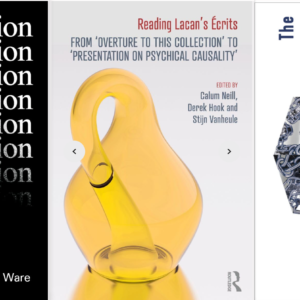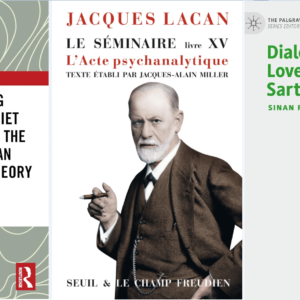News – February 2021
Want to receive this news via email each month? Sign up here.
20% off and free global shipping on all Routledge titles for LacanOnline.com readers. Use this link and code S031 at the checkout.
Lacan’s Seminar IV, The Object Relation, was published by Polity last month in the UK and Europe, and will be available in the Americas next month. Until 30th April LacanOnline readers can get 20% off by ordering from Polity with the code PO421 – see details on the press release here. It is also available on Amazon. Edited by Jacques-Alain Miller and translated by A.R. Price, this is the Seminar in which Lacan discusses Klein’s work and the then-burgeoning object relations school, Levi-Strauss’s ground-breaking theory of myth, and Freud’s case histories of the Rat Man and Little Hans.
Ciano Aydin’s Extimate Technology: Self-Formation in a Technological World was released by Routledge last month. Drawing inspiration from Lacan’s idea of ‘extimacy’ the book looks at how new and emerging technologies undermine the traditional inside-outside dualism which has characterised our perception of selfhood in opposition to the external environment. Aydin argues that the role of technology in shaping who and what we are should be seen in terms of technological sublimation rather than attempts at making ourselves smarter or stronger. Christening this ‘Technological Sublimation Theory’, his philosophical references also include Nietzsche (the Will to Power) and Pierce (in relation to phenomenological and practical categories).
A translation by Jacques Houis of Jean-Pierre Clero’s Lacan and the English Language was published in February. Looking at how the Anglo-Saxon traditions in psychoanalysis, philosophy and mathematics influenced Lacan’s work, Clero notes that “Lacan’s relationship with the English language is both omnipresent and ambiguous.” It is indeed rare to go more than a few pages into any of Lacan’s Seminars without finding an English author referenced, so in this book Clero covers Lacan’s engagement with English-speaking philosophers (Bentham, Berkeley, Pierce, Russell), writers (Joyce, Shakespeare, Poe, Carroll), and fellow analysts (the Balints, Winnicott, Glover, and Fairbairn among many others). The book is on Kindle where it is not otherwise available in print.
Also out in February was Gabriel Tupinambá’s The Desire of Psychoanalysis: Exercises in Lacanian Thinking. Examining the present state of institutional psychoanalysis, particularly within the Lacanian community, it argues for a programme of conceptual innovation which re-thinks areas that the author feels have been under-theorised. Money, the role of analysands in shaping analytic theory, and “ideological dead ends that have become common sense in the Lacanian field” are all subject to discussion. Tupinambá is a philosopher and political activist as well as a practicing analyst in Rio de Janeiro. Slavoj Zizek writes the book’s foreword.
Looking ahead to publications coming later in the year, and Routledge have just announced that Shirley Zisser’s Writing, Speech and Flesh in Lacanian Psychoanalysis: Of Unconscious Grammatology will be out in August. Arguing that the organic is an inherent part of the linguistic categories which appear in Freud and Lacan’s work, Zisser encourages us to rethink Lacan’s ‘Return to Freud’ programme in terms of bodily enjoyment as much as linguistics. Psycho-linguistic categories are, she argues, “suffused with organicity” and thus Lacan’s work cannot be read simply as the introduction of Saussurean linguistics into psychoanalysis. The Derridean inspiration becomes clear in her argument that writing takes primacy over speech in psychoanalysis, in a relation that is less binary than it is topological. Zisser is an analyst practicing in Tel Aviv and her previous co-authored books include Lacanian Interpretations of Shakespeare and Art, Death and Lacanian Psychoanalysis.
From the journals, the latest edition of the Canadian Review of American Studies (Volume 51, Number 1, Spring 2021) is a Special Issue on Lacan in America, edited by Chris Vanderwees. The five articles in the collection look at the reception to Lacan’s work in the US from perspectives of media studies, literature, historiography, ideology critique, and clinical practice.
Turning to events, and on Friday 12th March Philip Hill will be speaking at the NWRPA on Feelings, Truth and Clinical Technique in Freud, Lacan and other Schools. The meeting is on Zoom and is £7.50 for non-members. In this extended, two-hour event, Hill will provide a clinically-orientated workshop on the place of feelings and truth in different schools of therapy. Hill is the author of Lacan for Beginners and Using Lacanian Clinical Technique: An Introduction.
On Saturday 14th March Bracha Ettinger will speak on ‘Late Lacan and After: Humanising life-drive in the age of gaze-screen-eye symbiosis’. This will be the first of two sessions, the second of which will take place on 21st March, and will offer response papers and a forum for discussion on Ettinger’s talk.
Hilda Fernandez-Alvarez will be giving a talk on Saturday 20th March on ‘Reloading malaise: Cyborgic enjoyments and new social bonding’. The lecture will explore aspects of the Freudian Unbehagen – the human discontent in civilisation – that is reloaded as the result of concurrent emergencies that the globe faces: the pandemic, climate change, and digital capitalism. The event is part of a series of lectures in the Virtual Enjoyment research project, exploring the rising alliance between science, technology, and capitalism under the current pandemic and its manifestations on the social link and the speaking body. The talk is free and open to all – details on how to register are here.
The Freud-Lacan Institute has announced it will host Darian Leader next month for a discussion on the topic of his upcoming book Jouissance: Sexuality, Suffering and Satisfaction (recently published in French under the title La jouissance, vraiment?) The talk – ‘Jouissance, Really’ – borrows from the French title and will take place on Saturday 24th April over Zoom. Registration is €30. Sign up here.
Finally, as a result of the ongoing pandemic the Executive Committee of the NLS has announced that this year’s Congress, ‘Bodily Effects of Language’, which had been due to take place in Ghent will now be held exclusively on Zoom and entirely in Plenary Session on the 22nd and 23rd May. The General Assembly will be held in June, also via Zoom (date to be announced shortly). Registration is open, and the blog for the Congress includes plenty of preparatory content, including the Argument for the theme of the Congress itself. Check it out at NLSCongress2021.com.
Got news? Get in touch.




Leave a Reply